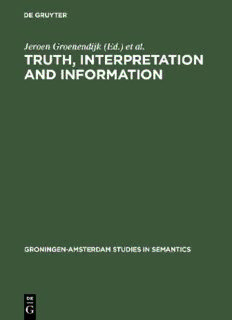Table Of ContentTruth,
Interpretation and
Information
Groningen-Amsterdam
Studies in Semantics (GRASS)
This series of books on the semantics of natural
language contains collections of orginal research on
selected topics as well as monographs in this area.
Contributions from linguists, philosophers, logicians,
computer-scientists and cognitive psychologists are
brought together to promote interdiciplinary and
international research.
Editors
Alice terMeulen
Martin Stokhof
Editorial Board
Renate Bartsch
University of Amsterdam
Johan van Benthem
University of Groningen
Henk Verkuyl
University of Utrecht
Jeroen Groenendijk
Theo M.V. Janssen
Martin Stokhof (eds.)
Truth,
Interpretation and
Information
Selected Papers from the Third Amsterdam Colloquium
Ψ
1984
FORIS PUBLICATIONS
Dordrecht - Holland/Cinnaminson - U.S.A.
Published by:
Foris Publications Holland
P.O. Box 509
3300 AM Dordrecht, The Netherlands
Sole distributor for the U.S.A. and Canada:
Foris Publications U.S.A.
P.O. Box C-50
Cinnaminson N.J. 08077
U.S.A.
ISBN 90 6765 002 1 (Bound).
ISBN 90 6765 001 3 (Paper)
® 1984 Foris Publications - Dordrecht.
No part of this publication may be reproduced or transmitted in any form or by any means,
electronic or mechanical, including photocopy, recording, or any information storage and re-
trieval system, without permission from the copyright owner.
Printed in the Netherlands by ICG Printing, Dordrecht.
Table of Contents
Hans Kamp
A Theory of Truth and Semantic Representation 1
Frank Veltman
Data Semantics 43
Edward L. Keenan
A Boolean Approach to Semantics 65
Barbara Partee and Emmon Bach
Quantification, Pronouns, and VP Anaphora 99
Remko J. H. Scha
Distributive, Collective and Cumulative Quantification 131
Peter van Emde Boas, Jeroen Groenendijk and Martin Stokhof
The Conway Paradox: Its Solution in an Epistemic Framework 159
GRASS-series
vol. 1. Studies in Modeltheoretic Semantics
vol. 2. Truth, Interpretation and Information
Selected Papers of the 3rd Amsterdam Colloquium
(incl. papers by Kamp, Keenan, Partee & Bach, Veltman)
Projected for 1983/4
vol. 3. Varieties of Formal Semantics. Proceedings of the 4th Ams-
terdam Colloquium, September 1982
vol. 4. Interrogative Quantification
All communications to the editors can be sent to:
Taakgroep Formeie Linguistiek
Rijksuniversiteit Groningen
Westersingel 19
9718 CA Groningen
the Netherlands
Preface
This second volume in the Grass-series contains a selection from the
proceedings of the Third Amsterdam Colloquium, which was held in
Amsterdam from March 25-28, 1980. The proceedings were published
originally by the Mathematical Centre under the title 'Formal Methods
in the Study of Language', in the Mathematical Centre Tracts series as
nos. 135 and 136. They are still available from the Mathematical Centre,
Kruislaan 413, Amsterdam, The Netherlands.
The main reason for re-issuing a selection of the original papers was to
make them more accessible, especially for a linguistic and philosophical
audience. We have selected for this volume those papers which deal with
some of the central issues which are currently being discussed, and
which have not been more widely circulated through publication in
another form.
As the title of this volume indicates, it is our opinion that the notions
of truth, (semantic) interpretation and information, and especially the
relations and interactions between them, are of central concern today,
not only in the enterprise known as formal semantics for natural lan-
guage, but also within those approaches which deal with natural lan-
guage semantics from a different perspective. The various papers in this
volume all deal with one or more of these topics, some from a more
theoretical, others from a more descriptive angle.
For this reissue, the original papers have been corrected and updated,
but not re-written extensively. We would like to thank the authors for
their co-operation.
Jeroen Groenendijk
Theo Janssen
Martin Stokhof
A Theory of Truth and Semantic
Representation
Hans Kamp
1. INTRODUCTION
Two conceptions of meaning have dominated formal semantics of natural
language. The first of these sees meaning principally as that which determines
conditions of truth. This notion, whose advocates are found mostly among
philosophers and logicians, has inspired the disciplines of truth-theoretic
and model-theoretic semantics. According to the second conception
meaning is, first and foremost, that which a language user grasps when he
understands the words he hears or reads. This second conception is im-
plicit in many studies by computer scientists (especially those involved
with artificial intelligence), psychologists and linguists - studies which
have been concerned to articulate the structure of the representations
which speakers construct in response to verbal inputs.
It appears that these two conceptions, and with them the theoretical
concerns that derive from them, have remained largely separated for a
considerable period of time. This separation has become an obstacle to the
development of semantic theory, impeding progress on either side of the
line of division it has created.
The theory presented here is an attempt to remove this obstacle. It
combines a definition of truth with a systematic account of semantic
representations. These two components are linked in the following manner.
The representations postulated here are (like those proposed by others;
cf. e.g. Hendrix (1975) or Karttunen (1976)) similar in structure to the
models familiar from model-theoretic semantics. In fact, formally they are
nothing other than partial models, typically with small finite domains.
Such similarity should not surprise; for the representation of, say, an
* This paper was written while I held a Post-Doctoral Fellowship at the Center for
Cognitive Science of the University of Texas at Austin. Anybody who has the faintest
acquaintance with my personality will realize that it would not have been written had
the Directors of the Center not given me this opportunity, and thus understand the
depth of my indebtedness to them. I would also like to thank, among the many who
helped me during my stay in Austin, Kate Ehrlich, Alan Garnham, Lauri Karttunen
and Stanley Peters for their comments and suggestions.

